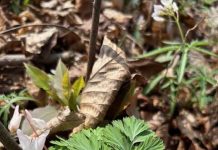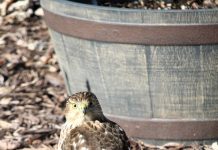A group of Hauser High School students was among the 10 teams to make it to the final round of a Midwest regional contest where students design and build automation systems.
The Phoenix Contact Nanoline Contest is hosted annually by Phoenix Contact, a global manufacturing company based in Middletown, Pennsylvania. Middle and high school students work with provided tool kit materials, including a Nanoline — an intelligent controller that automates basic tasks and requires no previous programming experience — to create an automated robot. Additionally, students work in teams to enhance their personal and project management skills.
“The goal of the project was to send in a rover-like device that could detect for hazards, essentially,” said Elijah Heslop, a freshman on Hauser’s team.
Students learned about the competition from their teacher, Deborah Gaff, during their Introduction to Computer Programming class. They each had personal interest in computer programming and decided to give the competition a shot.
[sc:text-divider text-divider-title=”Story continues below gallery” ]
The team included Heslop, sophomores Ethan Hoke and Andrew Tarkett and junior Patrick Snyder. Another student, sophomore Kaedon Asbury, was with the team in the beginning, Gaff said, but the practice schedule conflicted with his other activities. Asbury kept in touch with the team and helped whenever he could.
“Team members attended a workshop at Purdue to get started, then learned to code the VEX Robotics Design System robot and Nanoline controller, became experts at wiring I/O (on/off circuits) devices to their controller and learned about the importance of communication,” Gaff said.
All 40 teams in the Midwest submitted periodical progress checks over the course of the four-month competition. Teams were eliminated at each check, based on the amount of progress they had made, Heslop said.
During these stages, the students said that they faced:
Doubt that they would make it to the next progress check
Inner conflict as they learned to work together
Other unexpected setbacks, the biggest when they accidentally broke their first Nanoline
“My least favorite part was the one-and-a-half weeks after Andrew and I killed the Nanoline, and were unable to get hold of our regional contact,” Hoke said. “During this time we were very unsure whether we would be able to continue in this competition or not.”
But with the help and encouragement of Gaff, they were able to push through and keep working, they said.
The team made it past each check point, beating 30 teams to be one of 10 to make it to the final stage Feb. 4 at Purdue University. Heslop was absent from the culminating event because Science Olympiad was the same day.
Their robot was designed to detect carbon dioxide (CO2). However, the CO2 sensor failed to perform as required during the competition and they did not advance to national competition. But they didn’t walk away empty handed. They earned the excellence in communication award for their detailed explanations to the judges of each step they took — both good and bad — throughout the process.
Future plans
The students are already planning ways to improve their robot for next year.
“We have been throwing ideas around about improving this one, making it more manageable, smaller, compact, Hoke said. “But we’re also having ideas of expanding upon it with more sensors, maybe the possibility of communicating to a phone or something so, instead of it doing this it could send you a text message, that says, ‘Hey, high levels of CO2,’ or something like that.”
Another potential change includes detection of obstacles before the robot runs into them. The current sensor lets the robot know when it has reached an obstacle and then it will move away, but not before it runs into the blockage.
The team hopes to have a larger, more well-rounded team in the future. The students have begun reaching out to seventh- and eighth-graders, and students in Science Olympiad. They also are working with Gaff to create an internal contest at Hauser similar to the Nanoline Contest.
“Currently, we are working with Ms. Gaff to create a contest at Hauser based on building a vehicle capable of navigating around a designed obstacle course,” Hoke said. “We are still in the early process, but hope to be making teams for this competition by late March.”
[sc:pullout-title pullout-title=”Phoenix Contact Nanoline Contest” ][sc:pullout-text-begin]
The competition gives students a chance to design and build an automation system while working within a team.
A starter kit is given to each team and a gift card is included to help with the cost of additional materials.
Those interested in the competition should look for further details on registration and the 2018 competition in August at pheonixcontact.com and search for “Nanoline Contest.” You can also contact Jerry Wise, technical training specialist, at 800-888-7388 ext. 3412.
[sc:pullout-text-end]




